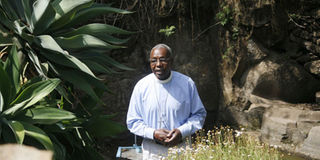Njoya condemns calls for Kenya to pull out of ICC

Rev Timothy Njoya during the interview at his Kirinyo Rock Garden office in Ngong on October 29 2013. PHOTO/PHOEBE OKALL
What you need to know:
- He wondered how Kikuyus were fighting for land in Rift Valley when they do not belong there originally.
- He blamed former colonial governor Edward Northey for shuffling populations “so that you do not have to live where you were born.” Because of the colonial roots of the cases, the Uhuru-Ruto cases could only be tried by a court that transcends tribes, he said.
Outspoken retired Presbyterian Church minister Timothy Njoya has plunged into the ICC debate, condemning suggestions for Kenya to pull out of the Rome Statute that created the Hague-based court.
In a wide-ranging interview with the Nation, the former moderator of St Andrew’s PCEA, Nairobi, said trying President Kenyatta and his deputy William Ruto in Kenya for the 2008 post-election crimes against humanity will ‘tribalise’ the cases.
“We have the psychology that Kenyatta and Ruto are being persecuted; that (the Rome Statute) is not our law; that the crimes... are crimes about land.”
He wondered how Kikuyus were fighting for land in Rift Valley when they do not belong there originally.
“This is not something that can be tried by traditional law because traditional law did not have people going to occupy other people’s land,” the Rev Njoya quipped.
He blamed former colonial governor Edward Northey for shuffling populations “so that you do not have to live where you were born.” Because of the colonial roots of the cases, the Uhuru-Ruto cases could only be tried by a court that transcends tribes, he said.
“We don’t have laws in Kenya that can try Kenyans on a crime of that magnitude. He gave examples of cases that had to be tried at the international level. “Germany had no law which could allow it to try Germans (after World War II) so Germans were not allowed to try Germans.” And more recently, Sudan’s Al-Bashir and Sierra Leone’s Charles Taylor had to be referred to the ICC, same with Bosnian trials.
“Similarly, Kenyans cannot be allowed to try Kenyans on crimes of such magnitude just as Rwandans were not allowed to handle 1994 genocide cases. “If you try that, the Tutsis and Hutus will continue to fight.”
He said: “If there is a court in Nairobi that convicts Ruto, we will fight — definitely — because people in Rift Valley will see (the judgment) as (emanating from) a Kikuyu law. They will never see it as a neutral arbiter.”
Therefore, “there must be a place for a law that transcends the conflicting parties.”
And what about getting the accused tried in an African country, say Tanzania? “That’s racism. We cannot hate white racism and when it comes to us being judged, we say we cannot be tried in a white place.”
Moreover, it would devolve tribalism in that it would not end at bringing cases to Africa, Dr Njoya said. “When you come to Kenya, you will demand ‘kamwana’. Our person should try us; and once you come to Central, you will say he (the judge) is not from Nyeri, he is from Kiambu. And once you get one from Mathira (in Nyeri), you will demand one from Mukurwe-ini. You will never end making excuses.
“Let me confess; I cannot try Ruto because I am a Kikuyu. And since I am exempted from trying him, it will be discrimination to deny me to try him and allow another tribe. The best way is to look for a neutral arbiter. God is our arbiter. And God is in The Hague at the moment.”





